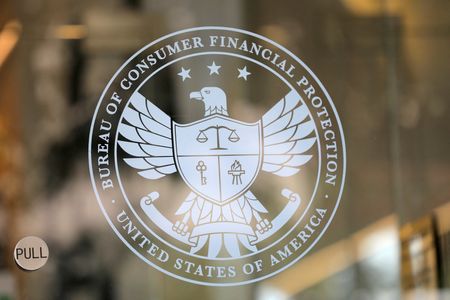By John McCrank
NEW YORK (Reuters) -Trade groups representing the U.S. financial industry sued the Consumer Financial Protection Bureau (CFPB) on Wednesday for what they said was the agency’s overstepping of its authority in its efforts to tackle discriminatory banking practices.
The lawsuit marks a major escalation of tensions between the industry and the consumer watchdog, which industry groups say has repeatedly overstepped its mandate under President Joe Biden’s director Rohit Chopra.
The CFPB in March amended its examination manual, which its examiners use to oversee financial firms, to include the review of policies that exclude individuals from products or services, or offer products or services in an unfairly discriminatory manner.
The groups said the agency does not have the legal authority to make that change.
“The Consumer Financial Protection Bureau is operating beyond its statutory authority and in the process creating legal uncertainty that will result in fewer financial products available to consumers,” said Neil Bradley, chief policy officer of the U.S. Chamber of Commerce, which is one of the plaintiffs.
The CFPB declined to comment specifically on the lawsuit, but a spokesman said the agency voluntarily publishes exam manuals laying out how it will assess banks’ compliance with the federal laws Congress charged it with enforcing.
“The CFPB’s exam manuals allow banks to ensure they are following the law, and help make certain that consumers are receiving the fair and equitable treatment they deserve,” the spokesman said.
The lawsuit takes aim at the CFPB’s inclusion of “disparate impact,” a legal theory that allows regulators to prosecute practices that adversely affect one group of people over others, though the rules may appear neutral.
Certain financial products, like no-fee checking accounts, could be seen as discriminatory using a disparate impact analysis, the Chamber said. Those accounts are typically offered to people with higher bank balances who are often further along in their careers, possibly pointing to discrimination against younger people.
“The CFPB is attempting to pretend that they are Congress and impose new theories of disparate impact through an extra-legal process,” Bradley said.
The Chamber was joined in the lawsuit, filed in the Eastern District of Texas, by the American Bankers Association and Consumer Bankers Association, among other state groups.
(Reporting by John McCrank; editing by Michelle Price, Nick Zieminski and Richard Pullin)





